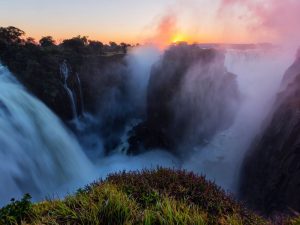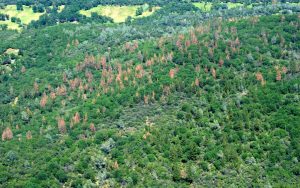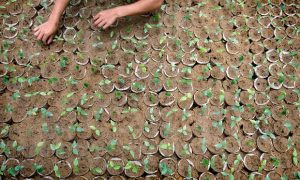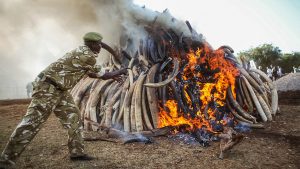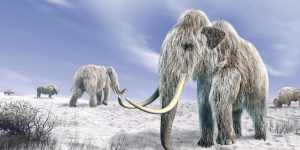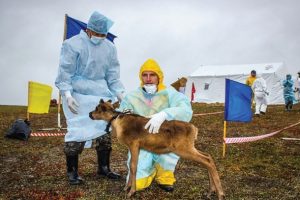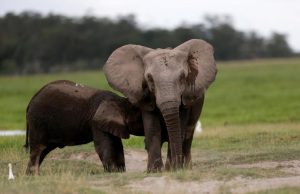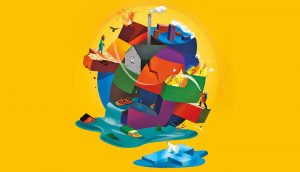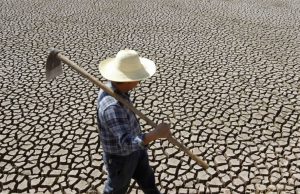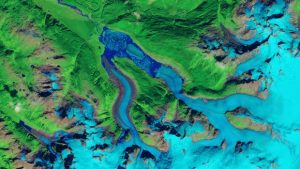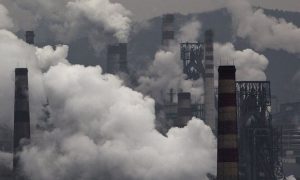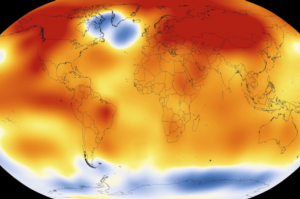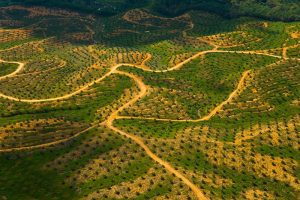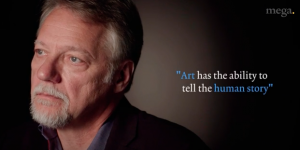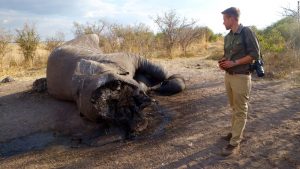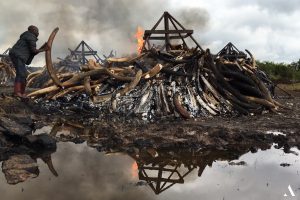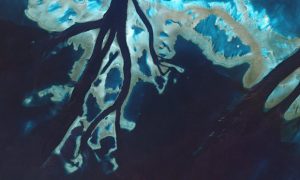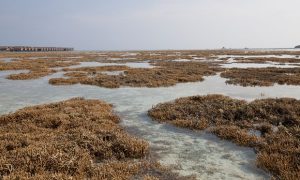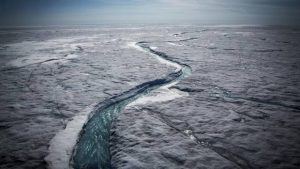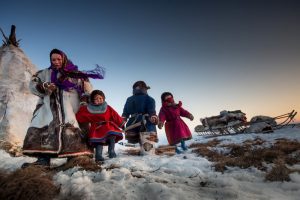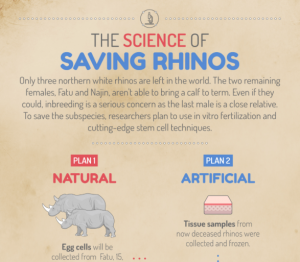
World temperatures hit new high for the third year in a row
By Alister Doyle | The Globe and Mail World temperatures hit a record high for the third year in a row in 2016, creeping closer to a ceiling set by the Paris climate change deal, with extremes including unprecedented heat in India and ice melt in the Arctic, scientists said on Wednesday. The findings, providing new…
Read MoreCities are the new laboratories of evolution
By Sarah DeWeerdt | Anthropocene Magazine Cities are driving rapid evolutionary changes to plant and animal species, according to a study published yesterday in the Proceedings of the National Academy of Sciences. Usually, we think of evolution as happening in remote, isolated, or pristine places—the Galapagos Islands, for example. But the new findings suggest that scientists can’t understand…
Read MoreWhy Should Humans Care if We’re Entering the Sixth Mass Extinction?
By Smithsonian.com | Smithsonian Magazine Sometime in the near geological future, the landscape of life on earth as we know it will be transformed. It’s a mass extinction, and it’s only happened five times before in Earth’s history. There have been severe ice ages, perplexing losses of oxygen from our oceans, massive volcanic eruptions, meteor impacts.…
Read More‘Unprecedented’: More than 100 million trees dead in California
By Michael Bodley | SFGate California’s lingering drought has pushed the number of dead trees across the state past 100 million, an ecological event experts are calling dangerous and unprecedented in underlining the heightened risk of wildfires fueled by bone-dry forests. In its latest aerial survey released Friday, the U.S. Forest Service said 62 million trees…
Read MoreThey may save us yet: Scientists found a way to turn our carbon emissions into rock
By Chris Mooney | The Washington Post Earlier this year, a project in Iceland reported an apparent breakthrough in the safe underground storage of the principal greenhouse gas, carbon dioxide — an option likely to be necessary if we’re to solve our global warming problem. The Carbfix project, run by a leading Icelandic producer of geothermal power, Reykjavik Energy,…
Read MoreGlobal ‘greening’ has slowed rise of CO2 in the atmosphere, study finds
By Damian Carrington | The Guardian A global “greening” of the planet has significantly slowed the rise of carbon dioxide in the atmosphere since the start of the century, according to new research. More plants have been growing due to higher CO2 levels in the air and warming temperatures that cut the CO2 emitted by plants…
Read MoreRecently killed elephants are fueling the ivory trade
By Virginia Morrell | Science Magazine The illegal trade in elephant ivory is being fueled almost entirely by recently killed African elephants, not by tusks leaked from old government stockpiles, as had long been suspected. That’s the conclusion of a new study, which relies on nuclear bomb tests carried out in the 1950s and ’60s to…
Read MoreSea Ice Shrinks in Step with Carbon Emissions
By Warren Cornwall | Science Magazine The jet fuel you burned on that flight from New York City to London? Say goodbye to 1 square meter of Arctic sea ice. Since at least 1960s, the shrinkage of the ice cap over the Arctic Ocean has advanced in lockstep with the amount of greenhouse gases humans have…
Read MoreWhat really happened to mammoths and other ice age giants
By Niki Rust | BBC Earth There might be as many as 10 million species of complex life on this planet today – a huge number. But add up all of the complex species that ever lived and some biologists think the grand total would be about five billion. The estimate leads to an astonishing conclusion:…
Read MoreAs Earth Warms, the Diseases That May Lie Within Permafrost Become a Bigger Worry
By Sara Goudarzi | Scientific American This past summer anthrax killed a 12-year-old boy in a remote part of Siberia. At least 20 other people, also from the Yamal Peninsula, were diagnosed with the potentially deadly disease after approximately 100 suspected cases were hospitalized. Additionally, more than 2,300 reindeer in the area died from the infection.…
Read MoreWildlife populations plunge almost 60 percent since 1970: WWF
By Alister Doyle | Reuters Worldwide populations of mammals, birds, fish, amphibians and reptiles have plunged by almost 60 percent since 1970 as human activities overwhelm the environment, the WWF conservation group said on Thursday. An index compiled with data from the Zoological Society of London (ZSL) to measure the abundance of biodiversity was down 58 percent…
Read MoreThe Mangrove Finch: An Extinction in Slow Motion
By John R. Platt | Scientific American One of Charles Darwin’s fabled finch species is slowly disappearing, even as conservationists work desperately to save it. This “slow-motion extinction,” as a newly published paper puts it, concerns the critically endangered mangrove finch (Camarhynchus heliobates). Native to the Galápagos Islands, the species has found itself plagued by invasive…
Read MoreUnderstand The World Better With This Illustrated User’s Guide To The Anthropocene
By Adele Peters | FastCo Exist Two decades ago, scientist James Lovelock imagined what the last book on earth should look like: a post-apocalyptic survival guide that explains the basics of the planet, why it collapsed, and how to avoid recreating the same mistakes. The idea morphed into something a little more helpful, a book we…
Read MoreUN: Global agriculture needs a ‘profound transformation’ to fight climate change and protect food security
By Chelsea Harvey | The Washington Post Climate change has already begun to affect the world’s food production, a new report from the United Nations warns — and unless significant action is taken, it could put millions more people at risk of hunger and poverty in the next few decades. It’s a message that’s been emphasized over and over…
Read MoreBreakage of monumental B.C. iceberg quietly sounds climate change alarm
By Mark Hume | The Globe and Mail A massive chunk of ice – thought to be the largest iceberg to ever break off a glacier in Canada – fell into a lake in British Columbia this summer and no one noticed until a U.S. scientist saw it on a NASA photo. Dr. Mauri Pelto, professor…
Read MoreThe world passes 400ppm carbon dioxide threshold. Permanently
By Brian Kahn | The Guardian In the centuries to come, history books will likely look back on September 2016 as a major milestone for the world’s climate. At a time when atmospheric carbon dioxide is usually at its minimum, the monthly value failed to drop below 400 parts per million (ppm). That all but ensures…
Read MoreLimiting the Planet to 1.5 Degrees C of Warming Is Crucial, but It Won’t Be Easy
By Clive Hamilton | Scientific American Astonishment was universal last December when the Paris Agreement on climate change included the aspiration to limit warming to 1.5° C above pre-industrial levels, a much tougher target than the standard of 2°, now seen as too risky. It was a remarkable triumph for a long campaign by the small…
Read MoreWWF Scorecard shows which companies kept their promises to consumers on palm oil
By WWF Gland, Switzerland. While many palm oil buyers are taking the right actions on palm oil, some have failed to keep their promises to consumers or are still doing nothing at all to help reduce deforestation and other adverse impacts of producing the world’s most popular vegetable oil in some of the most vulnerable tropical…
Read More375 top scientists warn of ‘real, serious, immediate’ climate threat
By John Abraham | The Guardian Yesterday, 375 of the world’s top scientists, including 30 Nobel Prize winners, published an open letter regarding climate change. In the letter, the scientists report that the evidence is clear: humans are causing climate change. We are now observing climate change and its affect across the globe. The seas are rising,…
Read MoreThanks to Mega for bringing awareness to The Anthropocene Project
Our new film is out! Watch @edwardburtynsky discuss his upcoming documentary the @anthropocene. #photography #art https://t.co/aWnGfKBpYo — Mega (@megaonline) September 12, 2016
Read More‘Our living dinosaurs’ There are far fewer African elephants than we thought, study shows
By David McKenzie and Ingrid Formanek | CNN | August 31, 2016 Linyanti Swamp, Botswana (CNN)Scanning Botswana’s remote Linyanti swamp from the low flying chopper, elephant ecologist Mike Chase can’t hide the anxiety and dread as he sees what he has seen too many times before. “I don’t think anybody in the world has seen the number of…
Read MoreOne of the World’s Biggest Fisheries Is on the Verge of Collapse
By Rachael Bale | National Geographic | August 29, 2016 PUERTO PRINCESA, PHILIPPINESYears ago Christopher Tubo caught a 660-pound blue marlin in the South China Sea. The fishing was good there, he says. Tuna fishermen would come home from a trip with dozens of the high-value fish as well as a good haul of other species.…
Read MoreOcean Slime Spreading Quickly Across the Earth
By Craig Welch | National Geographic | August 19, 2016 When sea lions suffered seizures and birds and porpoises started dying on the California coast last year, scientists weren’t entirely surprised. Toxic algae is known to harm marine mammals. But when researchers found enormous amounts of toxin in a pelican that had been slurping anchovies, they decided to…
Read MoreGiant Coral Reef in Protected Area Shows New Signs of Life
By Karen Weintraub | The New York Times | August 15, 2016 In 2003, researchers declared Coral Castles dead. On the floor of a remote island lagoon halfway between Hawaii and Fiji, the giant reef site had been devastated by unusually warm water. Its remains looked like a pile of drab dinner plates tossed into the…
Read MoreWorld Elephant Day
It's #WorldElephantDay & we are remembering the @kwskenya Ivory Burn as a powerful statement against the ivory trade pic.twitter.com/bL4sLzJKpG — Anthropocene Film (@anthropocene) August 12, 2016
Read MoreMore than 60% of Maldives’ coral reefs hit by bleaching
The Guardian | August 8, 2016 More than 60% of coral in reefs in the Maldives has been hit by “bleaching” as the world is gripped by record temperatures in 2016, a scientific survey suggests. Bleaching happens when algae that lives in the coral is expelled due to stress caused by extreme and sustained changes in temperatures,…
Read MoreThaw could release U.S. toxic waste buried under Greenland’s ice
OSLO – Reuters | The Globe and Mail | August 5, 2016 Global warming could release radioactive waste stored in an abandoned Cold War-era U.S. military camp deep under Greenland’s ice caps if a thaw continues to spread in coming decades, scientists said on Friday. Camp Century was built in northwest Greenland in 1959 as part…
Read MoreAnthrax Outbreak In Russia Thought To Be Result Of Thawing Permafrost
By Michaeleen Doucleff | NPR.org| August 3, 2016 Russia is fighting a mysterious anthrax outbreak in a remote corner of Siberia. Dozens of people have been hospitalized; one child has died. The government airlifted some families out because more than 2,000 reindeer have been infected. Officials don’t know exactly how the outbreak started, but the…
Read MoreDo the World’s Three Remaining Northern White Rhinos Have a Future?
By Rachel Nuwer | PBS NatureNOW | July 28, 2016 Sudan is the last of his kind on Earth. He just looks like a rhino. But as his keeper will quickly inform you, he is one of just three northern white rhinos remaining on the planet. The other two, a mother-daughter pair named Najin and Fatu,…
Read More

